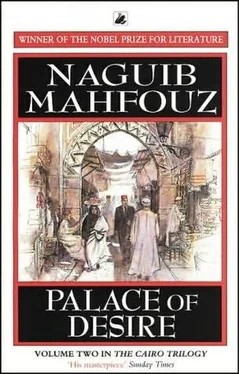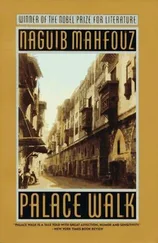Naguib Mahfouz - Palace of Desire
Здесь есть возможность читать онлайн «Naguib Mahfouz - Palace of Desire» весь текст электронной книги совершенно бесплатно (целиком полную версию без сокращений). В некоторых случаях можно слушать аудио, скачать через торрент в формате fb2 и присутствует краткое содержание. Жанр: Современная проза, на английском языке. Описание произведения, (предисловие) а так же отзывы посетителей доступны на портале библиотеки ЛибКат.
- Название:Palace of Desire
- Автор:
- Жанр:
- Год:неизвестен
- ISBN:нет данных
- Рейтинг книги:5 / 5. Голосов: 1
-
Избранное:Добавить в избранное
- Отзывы:
-
Ваша оценка:
- 100
- 1
- 2
- 3
- 4
- 5
Palace of Desire: краткое содержание, описание и аннотация
Предлагаем к чтению аннотацию, описание, краткое содержание или предисловие (зависит от того, что написал сам автор книги «Palace of Desire»). Если вы не нашли необходимую информацию о книге — напишите в комментариях, мы постараемся отыскать её.
, his rebellious children struggle to move beyond his domination, as the world around them opens to the currents of modernity and political and domestic turmoil brought by the 1920s.
Palace of Desire — читать онлайн бесплатно полную книгу (весь текст) целиком
Ниже представлен текст книги, разбитый по страницам. Система сохранения места последней прочитанной страницы, позволяет с удобством читать онлайн бесплатно книгу «Palace of Desire», без необходимости каждый раз заново искать на чём Вы остановились. Поставьте закладку, и сможете в любой момент перейти на страницу, на которой закончили чтение.
Интервал:
Закладка:
"You ask if I believe in love. My response is that love is still in my heart. I must acknowledge this truth of human nature. Although the roots of love were tangled up with those of religion and of other legends, the collapse of the sacred temples did not shake die pillars of love or diminish its importance. Its status remained unchanged even when its ceremonial niche was invaded by study and analysis. Examination of its biological, psychological, and sociological components has not harmed it. None of these investigations can make the heart pound any less fiercely when a special memory or image comes to mind."
"Do you still believe in love's immortality?"
"Immortality's just a myth. Presumably love will be forgotten, like everything else in the world."
"A year has passed since A'ida's wedding; why do you still hesitate to pronounce her name?"
"I've made some progress on the path to forgetfulness. I've traversed stretches of insanity, stupor, intense pain, and then less frequent discomfort. Now a whole day may pass without my thinking of her, except when I wake up or go to bed, and then once or twice during the day. When I remember her, that affects me in different ways. A mild longing is revived, a sorrow flees by like a cloud, or a regret stings but doesn't burn me. At times my soul will suddenly erupt like a volcano, as the earth turns under my feet. In any case, I've come to believe that I'll continue my life, even without A'ida."
"What do you rely on in your search for forge tfulness?"
"I depend on the study and analysis of love, as previously mentioned, and on minimizing my individual pains through speculations that embrace all of existence so that by comparison man's world seems a trivial speck. I also refresh my soul with alcohol and sex. I seek consolation with philosophers who specialize in it like Spinoza, who thinks that time is unreal, that passions linked to an event in the past or future make no sense, and that we're capable of overcoming them, if we can form a clear and distinct idea of them."
"Did it make you happy to discover love can be forgotten?"
"It did, because that promised me release from captivity, but the experience also saddened me by introducing me to death prematurely. In no matter what context, I'll despise bondage and love absolute freedom as long as I live."
"It's a happy person who has never thought of suicide or longed for death. It's a happy person who has the torch of enthusiasm blazing in his heart. A person's immortal when working or preparing seriously for work. A person's truly alive when he responds to Umar al-Khayyam's invitation to take up a book, a drink, and a sweetheart. A soul full of fervent hopes forgets or is oblivious to marriage in the same way that a glass full of whiskey has no room for soda water. What more can you want if your infatuation with drink continues happily and your encounters with women are not blocked by disgust or aversion. If you long occasionally for purity and asceticism, that could be a holdover from your previous piety."
The rain kept pouring down. Thunder roared, and there was a gleam of lightning. The street was deserted and all its cries silenced. Wishing to look at the courtyard, he left the bedroom and went to the window of the sitting room. Gazing out the peephole, he saw that water was washing away the loose dirt on the surface, eroding it, and then rushing off toward the old well. Water was also flowing out of the well on the other side and flooding a depression between the oven room and the storeroom. In that declivity, where a residue of wheat, barley, and fenugreek seed, accidentally dropped by Umm Hanafi, had collected, a growth like green silk brocade would sprout. For some days it would thrive, until trampled by their feet. In his childhood, that area had served as the setting for his maneuvers and his dreams. That wellspring of memories still supplied his heart with a yearning and a delight shaded by sorrow like a diaphanous cloud veiling the face of the moon.
Turning away from the window to go back to his room, he became aware of the presence of other people in the sitting room. They were the last remnants of the old coffee hour. His mother sat on the sofa with her legs tucked beneath her and her arms spread over the brazier. She had no one to keep her company save Umm Hanafi, who sat cross-legged on a sheepskin opposite her mistress. He thought of the gathering in its brightest days and of the beautiful memories it had left behind. The brazier was the only survivor not to have undergone changes the viewer wished to reject.
112
Ahmad Abd al-Jawad walked slowly along the bank of the Nile on his way to Muhammad Iffat's houseboat. The night was calm, the sky clear, the stars twinkling, and the weather cool. When he reached the gangplank and started across it, he glanced from force of habit at the distant houseboat he had once called Zanuba's. A year had passed since those painful events, and all that was left of them in his heart was resentful embarrassment. One other consequence had been his boycott of parties comparable to his previous ban following Fahmy's death. He had avoided them scrupulously for a year, before becoming exasperated. After a change of heart, he was now seeking out the forbidden bacchanal.
The next moment he was joining the beloved gathering and seeing his three male friends and the two women. The men he had seen as recently as the previous night, but he had not set eyes on the women for about a year and a half or, to be precise, not since the night Zanuba had been introduced to his life. The party had yet to begin, for the liquor bottles were full and decorum was still being observed. Jalila, who occupied the main sofa, was toying with her gold bracelets as if wanting to make them jingle. Zubayda, who stood beneath the hanging lamp, was examining her appearance in a small mirror she held in her hand. Her back was to the table crowded with whiskey bottles and plates of appetizers.
Bareheaded, the three men, who had removed their cloaks, were scattered around the room. Ahmad Abd al-Jawad shook hands with them and then warmly clasped the hands of the women.
Jalila greeted him, "Welcome, dear brother."
Zubayda cast him a censorious smile as she said, "Welcome to a person who would deserve nothing but goodbye from us, except for common courtesy."
The man removed his cloak and fez and looked around for a vacant place. Zubayda had taken a seat next to Jalila. He hesitated a little before going to their sofa and sitting there. His vacillation did not escape the eyes of Ali Abd al-Rahim, who said, "You almost seem a novice at this."
Jalila tried to encourage al-Sayyid Ahmad by telling Ali Abd al-Rahim, "Leave him alone. There's never been any reserve between us."
Zubayda was quick to laugh and say scornfully, "I'm the one with the most right to say that. Isn't he my in-law?"
Al-Sayyid Ahmad understood her allusion and wondered anxiously how much she knew of the whole affair. But he replied tenderly, "It's my honor, sultana."
Gazing at him suspiciously, Zubayda asked, "Are you really pleased with what's happened?"
He answered suavely, "Only because you're her aunt."
Waving her hand in disapproval, she said, "My heart will never forgive her."
Before al-Sayyid Ahmad could ask why, Ali Abd al-Rahim, who was rubbing his hands together, yelled, "Save the conversation till we've filled our heads". After rising and going to the table, he opened a bottle and poured drinks, which he presented to them, one at a time, with a solicitude that revealed his customary satisfaction with tending bar. Then he waited until everyone was ready before saying, "To the health of our lovers, our brothers, and music. May we never lack these three things."
Smiling, they raised their glasses to their lips. Ahmad Abd al-Jawad looked over the rim of his at the faces of his companions, these friends with whom he had shared affection and loyalty for almost forty years. They almost seemed slivers of his heart. He could not keep his feelings of sincere fraternal affection from agitating his breast. As his eyes turned to Zubayda, he resumed his conversation with her, asking, "Why won't your heart forgive her?"
Читать дальшеИнтервал:
Закладка:
Похожие книги на «Palace of Desire»
Представляем Вашему вниманию похожие книги на «Palace of Desire» списком для выбора. Мы отобрали схожую по названию и смыслу литературу в надежде предоставить читателям больше вариантов отыскать новые, интересные, ещё непрочитанные произведения.
Обсуждение, отзывы о книге «Palace of Desire» и просто собственные мнения читателей. Оставьте ваши комментарии, напишите, что Вы думаете о произведении, его смысле или главных героях. Укажите что конкретно понравилось, а что нет, и почему Вы так считаете.












